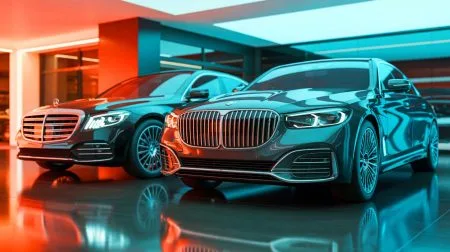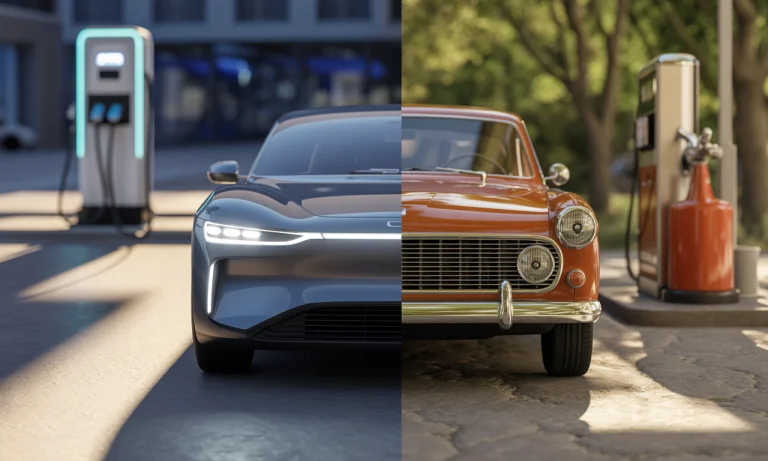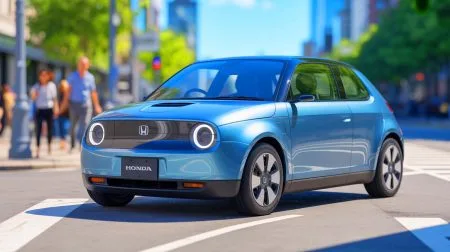Across city streets and country highways, the shift from gasoline to electric vehicles has become more than a trend—it’s a pivotal transformation radically altering how drivers weigh their next purchase. While glamorous brands like Tesla and BMW spearhead the EV charge, industry giants such as Toyota, Ford, Honda, Nissan, Hyundai, Kia, Volkswagen, and Chevrolet are rapidly adapting, eager not to be left behind. Environmental urgency, the promise of low running costs, and ever-expanding incentives now meet the familiar reliability and reach of traditional gas-powered cars. In a landscape punctuated by rising energy questions and stories of commuters stretching every dollar, the decision between a gas or electric vehicle has never carried more personal and societal weight. Whether one seeks performance thrills, long-haul comfort, or a lighter ecological footprint, the lines of this automotive debate are drawn—and every driver’s choice writes a new chapter for the roads ahead.
Electric Cars vs. Gas Cars: Comparing Performance, Range, and Speed
Lucas, a city-dweller facing the daily grind, found himself torn between his love for high-speed road trips and the allure of cutting-edge EV tech. He test-drove a Tesla—the rush of instant acceleration unmistakable, the cabin nearly silent except for his own heartbeat. Electric vehicles, thanks to their unique motors, produce peak torque instantly, resulting in a thrilling, responsive drive at any stoplight. The Tesla Model S Plaid, for instance, can outpace legendary sports cars, including the Chevrolet Corvette, in a 0–60 mph sprint, yet offers the calm of a quiet, emission-free ride.
In contrast, Lucas’s friend Sarah swears by her gasoline-powered Ford Mustang, which easily pushes past the highway speed limits and offers uninterrupted long-distance journeys without worrying about finding a charger. While EVs excel at quick acceleration, gas vehicles still retain an edge in sheer top speed and are better suited for those who demand high-speed stability over prolonged distances. However, with improvements in batteries and charging technology, the line between the two gets thinner every year.
| Performance Factor | Electric Vehicle (e.g., Tesla, Hyundai) | Gas Vehicle (e.g., Ford, Toyota) |
|---|---|---|
| 0–60 mph Acceleration | Often faster (under 3 seconds for some) | Slower, except high-end sports models |
| Top Speed | Generally lower | Higher in most models |
| Ride Comfort | Quieter, smoother | Engine noise, vibration present |
| Long-term Endurance | Battery impact at high speeds | Consistent power over long distances |
Range Anxiety Versus Refueling Freedom: The True Daily Dilemma
Range—the modern driver’s reality check. For many, the daily commute doesn’t exceed 30 miles, and today’s electric models from Kia, Nissan, and Volkswagen quietly make such routines nearly effortless. Charging overnight at home or even at the office (where more parking lots boast charging stations) transforms the perception of range from limitation to luxury.
Yet, stories abound of rural journeys or last-minute road trips where the relative scarcity of high-speed chargers leaves even the bravest EV owner nervously eyeing their dashboard—here, the trusty gas car shines. Toyota and Honda, revered for their fuel efficiency and durability, provide comfort with every mile, a network of filling stations never more than a few minutes off the highway. For some, especially beyond the city limits, the freedom to refuel in five minutes outweighs any electric perk.
| Feature | Electric Vehicle | Gas Vehicle |
|---|---|---|
| Average Range | 250–300 miles (select models can exceed) | 250–350 miles |
| Home Charging | Yes, overnight convenience | No |
| Refueling Time | 30 min (fast charger) to 8+ hrs (home) | 5 min (typical fill-up) |
| Charging/Fueling Network | Expanding—urban centers best covered | Extensive |
Total Costs and Maintenance: Calculating the Real Investment
The sticker price tells only half the story. For first-time EV buyers, the upfront cost—whether eyeing a Hyundai, Kia, or Nissan—can sting, yet over the years, the tide of savings flows steadily back. Routine oil changes, spark plug swaps, and exhaust repairs fade into memory, replaced by simple software updates and battery health monitoring. The average electric driver in the USA now pays less than $7 per charge, about half the cost per mile compared to gas vehicles, as highlighted in recent industry analysis.
Factor in the evolving landscape of tax credits and manufacturer incentives, and the equation becomes even more compelling. Lucas, with his digital spreadsheet, calculated a possible $7,500 in combined federal and state rebates, nudging the balance favorably toward an electric car. Meanwhile, his cousin—a loyal Honda enthusiast—notes that a gas car, while cheaper at the outset, brings a parade of maintenance bills: oil, coolant, filters, and fuel costs that can quietly add up to a significant sum over a decade’s ownership.
| Cost Component | Electric Vehicle (e.g., Nissan, Kia, Hyundai) | Gas Vehicle (e.g., Ford, Toyota, Honda) |
|---|---|---|
| Average Upfront Price | Higher (offset by incentives) | Lower initial cost |
| Annual Fuel/Energy Cost | $500–$700 | $1,300–$2,000 |
| Maintenance (yearly) | $400–$600 | $900–$1,500 |
| Lifespan (miles/years) | ~200,000 / 12 yrs | ~150,000 / 8 yrs |
Lifespan and Reliability: Which Car Lasts Longer?
Endurance speaks volumes. Electric cars—whether a BMW i4 or Volkswagen ID.4—now reliably stretch to 200,000 miles or 12 years, often outlasting their gas-powered siblings by significant margins. The secret lies within the simplicity of their engineering: fewer moving parts mean fewer breakdowns. Tales from maintenance workshops suggest that a 10-year-old EV, barring the rare battery swap, keeps its composure with fewer service visits than a similarly aged gas vehicle, notorious for transmission hiccups or exhaust woes.
Yet EVs aren’t without their Achilles’ heel. Once warranties end, battery replacement, though less frequent, can be costly. Automakers like Tesla and Hyundai offer extended battery warranties to allay such concerns. For many urban drivers, this peace of mind seals the deal, but for those far from the next dealership, the long-term reliability of a gasoline Honda or Toyota can still sway the verdict.
Emissions and Environmental Impact: Who Wins for Eco-Friendliness?
The climate case grows clearer with each passing year. Electric models—especially when charged from clean energy—create no tailpipe emissions, their presence in growing cities like Los Angeles or Toronto a silent partner in the battle for cleaner air. Data from the U.S. Department of Energy paints a stark picture: EVs, plug-in hybrids, and hybrids consistently outperform traditional vehicles in annual emissions.
But the story is nuanced. Vehicle production, from the batteries of Hyundai to the steel chassis of a Ford, leaves a mark on the environment. And where coal still generates grid power, the environmental benefit narrows. Yet, compared side by side, the Volkswagen or BMW EV ends its first decade having produced far less pollution, offsetting initial manufacturing costs with every mile traveled. Critics reference reports highlighting that even after accounting for battery production, electric vehicles quickly close the emissions gap over their lifespan, especially as renewable energy integration accelerates globally.
| Emission Source | Electric Vehicle | Gas Vehicle |
|---|---|---|
| Tailpipe Emissions | Zero | CO₂, NOx, particulate |
| Lifecycle CO₂ (est.) | Lower over lifetime | Higher |
| Waste/Oil Disposal | Minimal | Frequent |
The Impact of Innovation: What the Next Decade Holds
By mid-decade, the electric revolution feels unstoppable. Governments propose bold bans on new gas car sales by 2035, with Volkswagen and BMW announcing all-electric lineups, while Toyota and Ford invest heavily in hybrid and hydrogen research. The tide of technology—battery breakthroughs, smarter grids, and lightning-fast chargers—promises to reshape the very notion of car ownership. Visionaries track the latest news, such as when Tesla’s autonomous ambitions make headlines or when hydrogen-powered engines disrupt the status quo, as noted in futuristic innovations.
This isn’t just hype—it’s a testament to how daily choices, whether by a parent shuttling kids in a Kia EV or a cross-country traveler in a Chevrolet hybrid, signal a commitment to cleaner, smarter mobility. For the consumer making the pivotal decision, every new model, every policy shift, becomes a stepping stone on the path toward a more sustainable tomorrow.
Frequently Asked Questions
Is it really cheaper to drive an electric car than a gas car?
Yes, long-term ownership of an electric vehicle saves money through lower energy and maintenance costs, especially when factoring in federal and state incentives. For most drivers, savings grow with each passing year behind the wheel.
How long do electric car batteries really last?
Modern EV batteries commonly last 8 to 12 years or 200,000 miles, with many brands, including Tesla, Nissan, Hyundai, and Kia, offering warranties to cover this span. Battery replacement costs have also decreased as technology advances.
What about driving an EV in cold climates?
EV range can decrease in extreme cold, though new models feature battery pre-conditioning and improvements that help retain capacity. Planning ahead and utilizing public fast chargers can minimize inconvenience in winter conditions.
Do electric cars really help the environment?
Electric vehicles produce zero tailpipe emissions, and their overall environmental impact continues to improve as clean and renewable energy expands on the grid. Over their lifetime, they are consistently greener than gasoline vehicles.
Are gas cars going away?
Many regions plan to phase out sales of new gasoline cars by 2035, but gas vehicles will remain on the roads for years due to large existing fleets. The transition to electric is accelerating as more automakers and governments commit to bold targets.
Read more in-depth automotive industry analysis
Did you like it? 4.6/5 (23)







